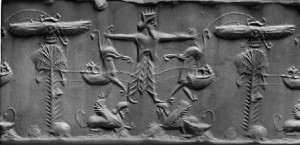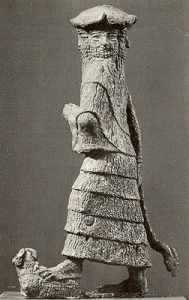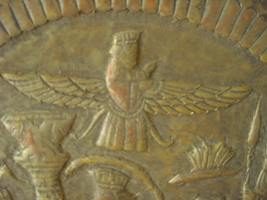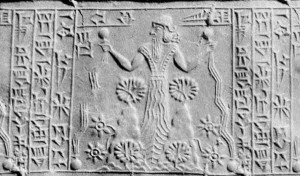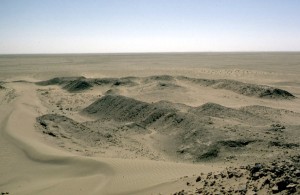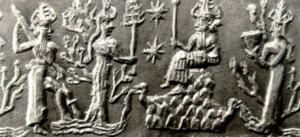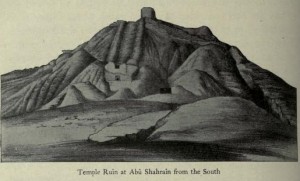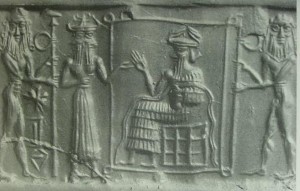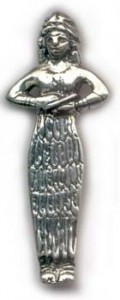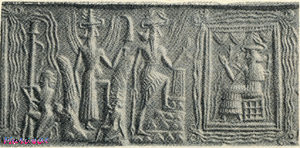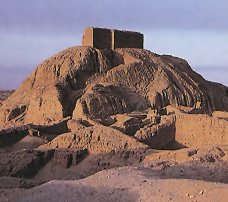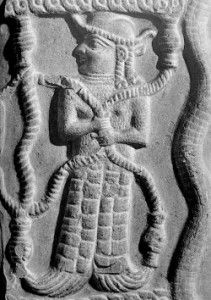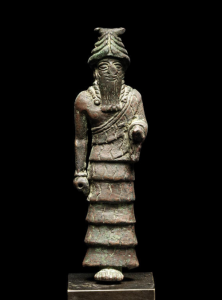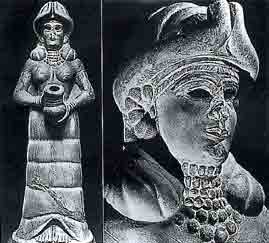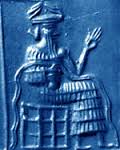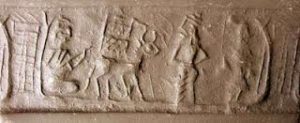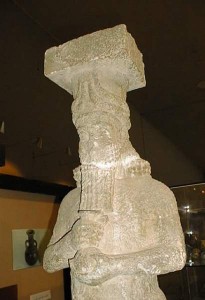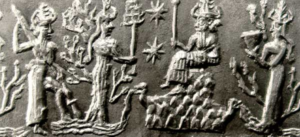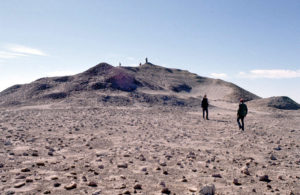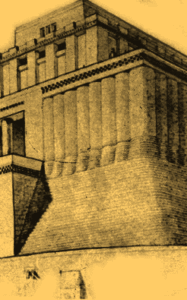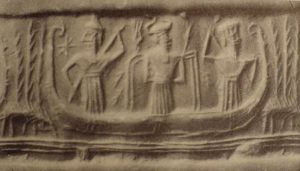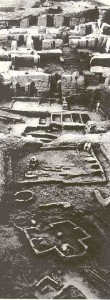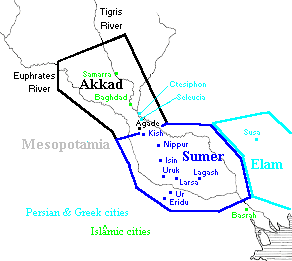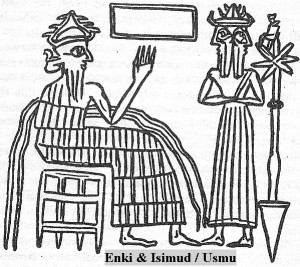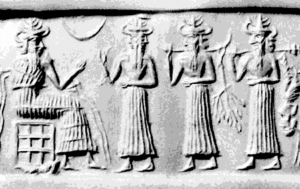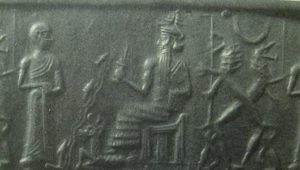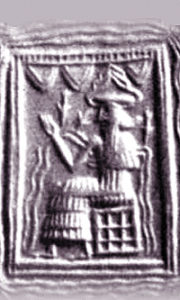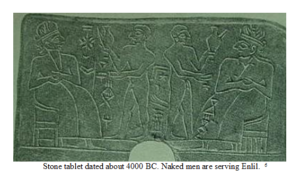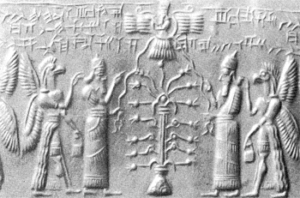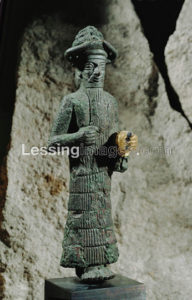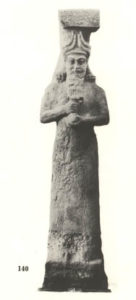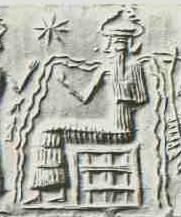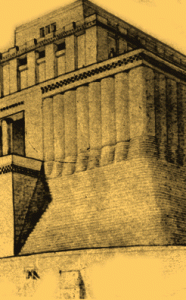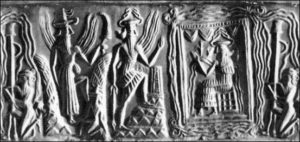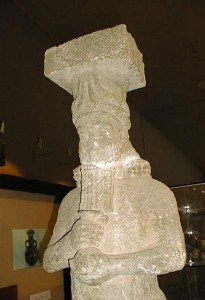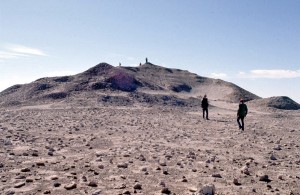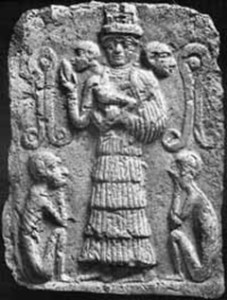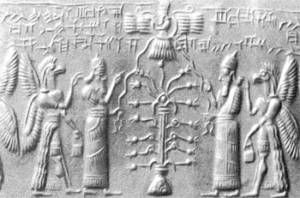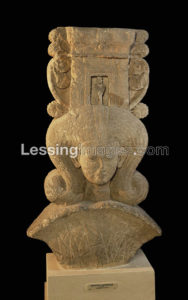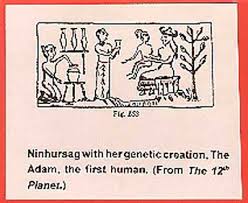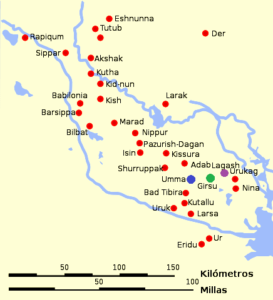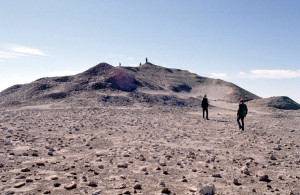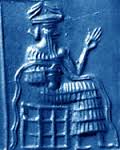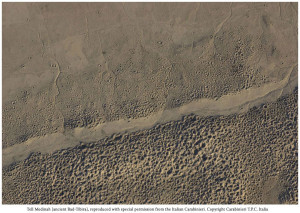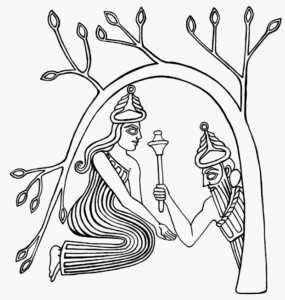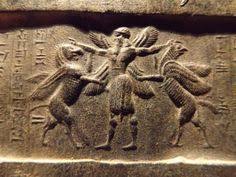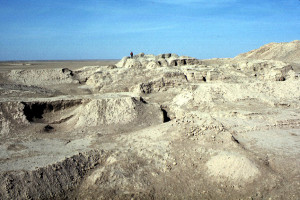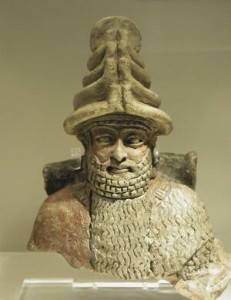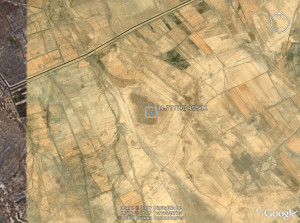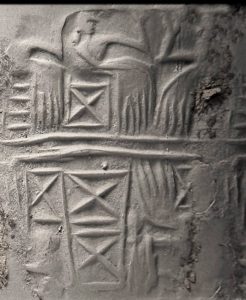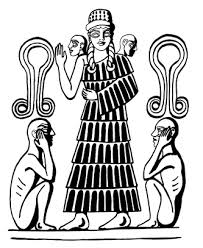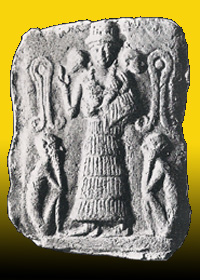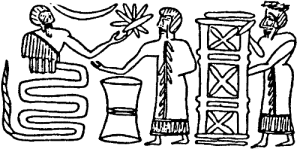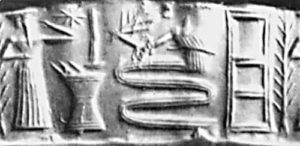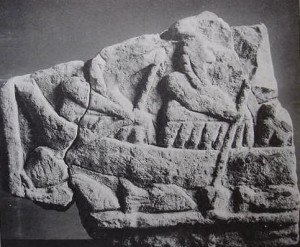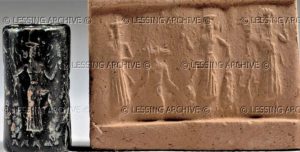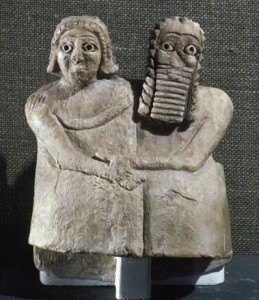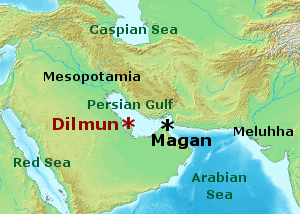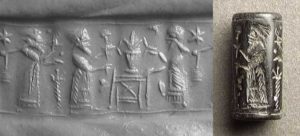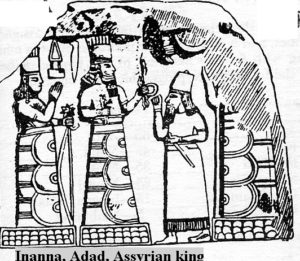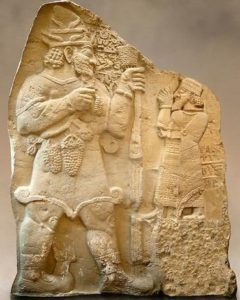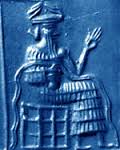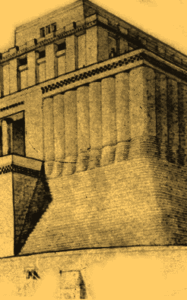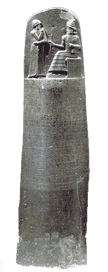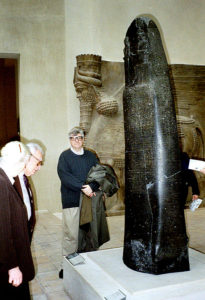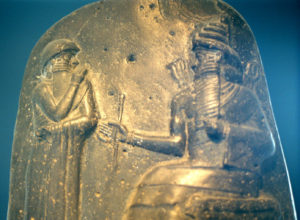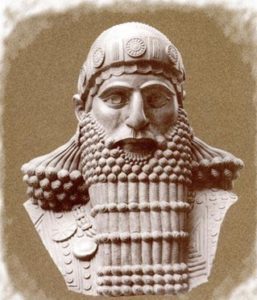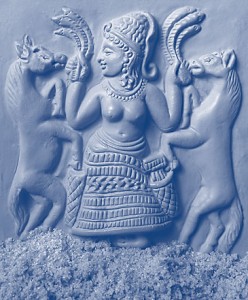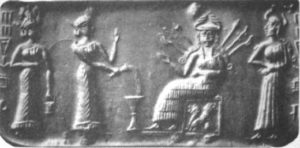Records of the Past, 2nd Series, Vol. IV , ed. by A.H. Sayce, [1890], at sacred-texts.com
(Texts: All Artifacts, Color Coding, & Writings in Bold Type With Italics Inside Parenthesis, are Added by Editor R. Brown, not the Authors, Translators, or Publishers!)
(gods in blue …mixed-breed demigods in teal…)
COLUMN I
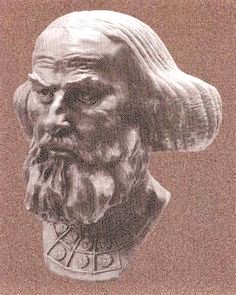 (semi-divine Assyrian King Shalmaneser III, who walked with gods)
(semi-divine Assyrian King Shalmaneser III, who walked with gods)
1. Shalmaneser, the great king, the powerful king, the king of hosts, [the king of Assyria] …
2. the pitiless one, who subjugates the rebellious … [who a rival]
3. has not. The great, the incomparable, the heroic one, … [clothed]
4. with splendor, who fears not opposition; [who from the rising of the sun]
5. to the setting of the sun commands …
(Marduk with winged sky-disc battles animal symbols for his cousins)
6. is powerful. In those days, through the great lord, Merodach (Marduk) …
COLUMN II
1. … [After that the gods] had placed in my hands the insignia of mankind,
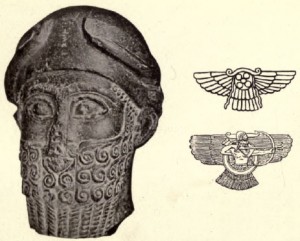 (Ashur, warrior son to Marduk)
(Ashur, warrior son to Marduk)
with the help of Assur (Osiris), the great lord, my lord, and of the god
who loves my priesthood, [I trod] the summits of all mountain- ranges
2. to the extremities of them all, [as far as] the sea of Nairi and the sea of Zamua- sa-Bittani1 and the great sea of Syria. The country of the Hittites, to its very extremities, like a mound
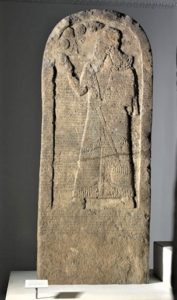 (stele of semi-divine giant king Shalmaneser III)
(stele of semi-divine giant king Shalmaneser III)
3. swept by the wind, I ravaged … I spread over the country of the Hittites the [terror] of the glory of my sovereignty. In my passage from the sea2 I erected a great image of my majesty, (and) set (it) up along with that of Assur-irbe.1
4. … I marched [to] the great [sea]; I purified my weapons in the waters; I offered sacrifices to my gods; I received the tribute of all the kings of the shores of the sea.
5. … I erected [an image of my majesty beside] the sea; I wrote upon it; I set it up overlooking the sea. From the country of Enzite to the country of Dayaeni, from the country of Dayaeni to
6. [the country of] … I possessed myself [of Arzashkun, the royal city of Ara]me, of the land of Ararat, I threw (it) down, dug (it) up and burnt (it) with fire. While I was staying in Arzashkun, Arame, of the country of Ararat, to the multitude of his forces
COLUMN III
1. trusted and gathered all his troops; to give combat and battle he came against me. I utterly defeated him; I cut his fighting-men to pieces. I slew with weapons 3000 of his soldiers. With the bodies of his warriors
2. I filled the broad plain; I took from him his engines of war, his royal treasures (and) numerous war-material. To save his life he ascended an inaccessible
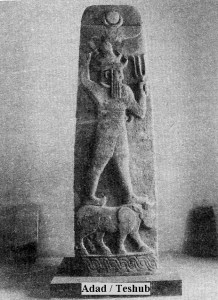 (Adad, the Thunder God of many cultures, due to his alien weaponry)
(Adad, the Thunder God of many cultures, due to his alien weaponry)
mountain. Like Hadad (Adad)2 I overthrew the widespread land of Qute.3 From the city of Arzashkun to the country of Guzan,
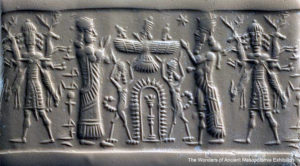 (giant semi-divine king with 2 antelope below air gods in stormy sky-disc)
(giant semi-divine king with 2 antelope below air gods in stormy sky-disc)
3. from the country of Guzan to the country of Khupushkia, like the stormy Air- god (thunder god Adad, Air-god Enlil) I roared upon them. I displayed over the country of Ararat the splendor of my sovereignty. Akhuni the son of Adini, who, with the permission of the kings my fathers, power and strength
4. had acquired, (whom) at the beginning of my reign I had shut up in his city, whose crops I had gathered, whose plantations I had cut down, to save (his) life had crossed the Euphrates (and) the city of Shitamrat, a mountain-peak which hangs from the sky like a cloud, for
5. his stronghold had taken. For the second time1 I pursued after him; the mountain-peak I besieged. My soldiers swooped upon them like birds of prey.2 I captured 17,500 of his troops. Akhuni with his troops, his gods, his chariots
6. (and) his horses, I caused to be brought before me; I carried (them) to my city of Assur (named after alien god Ashur) [and settled them among the people of my own land.]
COLUMN IV
1. In the eponymy of Samas-bel-utsur,3 in the time of Merodach–sum-iddin the king of Babylonia,4 Merodach-bel-usâte his brother revolted against him. They divided the country into (two) factions. Merodach-sum-iddin to ask help to Shalmaneser sent
2. his ambassador. Shalmaneser, the impetuous chief, whose trust is Adar,5 took the road; he gave the order to march against Akkad 6 I approached the city of Zaban;7 victims before Hadad (Adad / Ishkur)8 my lord
3. I sacrificed. I departed from Zaban; to the city of Mê-Turnat I approached;9 the city I besieged, I captured; his fighting-men I slew; his spoil Icarried away. From the city of Mê-Turnat I departed; to the city of Gannanate1
4. I approached. Merodach-bel-usâte, the lame king, ignorant how to conduct himself, came forth against me to offer combat and battle. I utterly defeated him; his fighting-men I slew; in his city I shut him up. His crops
5. I gathered in; his plantations I cut; his river I dammed up. In a second expedition, in the eponymy of Bel-bunâya,2 on the 10th day of the month Nisan, I departed from Nineveh. The Upper Zab
6. and the Lower (Zab) I crossed. To the city of Lakhiru I approached. The city I besieged, I captured. Its fighting-men I slew, its spoil I carried away. From the city of Lakhiru
COLUMN V
1. I departed. To the city of Gan[na]nate I approached. Merodach-bel-usâte came forth like a fox from his hole; towards the mountains of Yasubi he set his face. The city of Arman
2. he took for his stronghold. The city of Gannanate I captured; its fighting-men I slew, its spoil I carried away. I ascended the mountains after him. In the city of Arman I shut him up; the city I besieged, I took. His fighting-men
3. I slew, his spoil I carried away. I put Merodach-bel-usâte to death with weapons. Of the miserable soldiers who (were) with him not one did I leave. When Merodach-sum-iddin had conquered his enemies, [and] Shalmaneser
4. the powerful king had fulfilled the desire of his heart, he exalted thee, O great
 (Marduk with 2 left hands, & his animal symbol Mushhushshu)
(Marduk with 2 left hands, & his animal symbol Mushhushshu)
lord Merodach (Marduk)! Shalmaneser the king of Assyria ordered the march to Babylon; he arrived at Kutha,3 the city of the warrior of the gods4
5. the exalted ones, (the city) of the Sun-god (Utu) of the south. At the gate of the temple he prostrated himself humbly, and presented his sacrifice; he made offerings. He entered also into Babylon, the bond of heaven to earth (rivaling Enlil’s Nippur Command), the seat of life;1
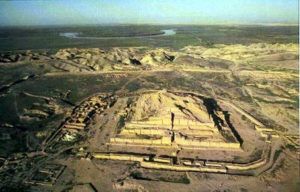
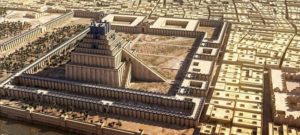 (E-Sagil, Marduk’s ziggurat temple residence in Babylon)
(E-Sagil, Marduk’s ziggurat temple residence in Babylon)
6. he ascended also to Ê-Sagil (Marduk‘s temple residence in Babylon), the palace2 of his gods as many as there are; before Bel (Enlil, or Marduk) and Beltis (spouse Ninlil, or Sarpinat) he was seen to pass and he directed their path. Their propitiatory sacrifices (and) pure offerings on Ê-Sagil
COLUMN VI
I. he lavished. He visited all the shrines3 in Ê-Sagil and Babylon: he presented his pure sacrifice. He took also the road to
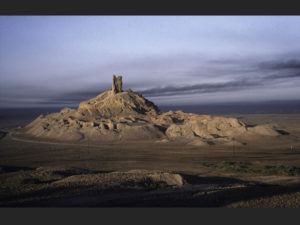
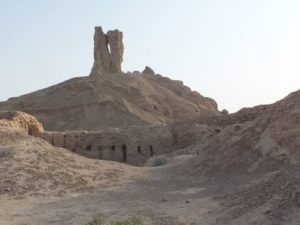 (E-Zida,Nabu’s ziggurat residence & Tower of Babel in Borsippa)
(E-Zida,Nabu’s ziggurat residence & Tower of Babel in Borsippa)
2. Borsippa,4 the city of the warrior of the [god]s,5 the angel (?) supreme. He entered also into Ê-Zida (Nabu’s temple residence in Borsippa)6 … he prostrated himself before the temple of his immutable oracle, and in the presence of Nebo (Nabu) and Nana (Nanaya)
3. the gods his lords he directed reverently his path. Strong oxen (and) fat sheep he gave in abundance. He visited all the shrines3 in Borsippa and Ê-Zida; each time
4. he offered libations (?). For the men of Babylon and Borsippa, the vassals of the great gods, he made a feast, and gave them food (and) wine; with embroidered robes he clothed (them); with presents
5. he endowed them. After that the great gods had favorably regarded Shalmaneser, the powerful king, the king of Assyria, had directed his face, had granted the desire (?) of his heart and strength, (and) had heard his prayers, I departed from Babylon; [to] the country of Chaldæa1
6. I descended. To the city of Baqâni, a fortress of Adini the son of Dakuri I approached. The city I besieged, I captured. His numerous soldiers I slew; their rich spoil, their oxen (and) their sheep, I carried away. The city I threw down, dug up (and) burned with fire. From the city of Baqani I departed; the Euphrates hard by it I crossed. The city of Enzudi,
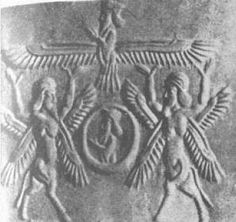 (the overwhelming terror of Marduk from the air)
(the overwhelming terror of Marduk from the air)
7. the royal city of the aforesaid Adini, I approached. As for Adini the son of Dakuri, the terror of the glory of Merodach the great lord overwhelmed him, and I received from him … silver, gold, copper, lead, iron, muskanna wood, ivory, (and) elephants’ skin. While I was staying [on the shores] of the sea,2 the tribute of Yakin the king of the maritime country
8. and of Musallim-Merodach the son of Amukkani, silver, gold, lead, copper, [iron], muskanna wood, [ivory, and] elephants’ skin, I received.
Footnotes
74:1 See Records of the Past, new series, p. 149, note 6.
74:2 Lake Van.
75:1 See Monolith Inscription, II. 10 (above, p. 61).
75:2 [Rather Nerra the demon of pestilence. See my Lectures on the Religion of the Babylonians, pp. 195, 311–314.—Ed.]
75:3 [Also called Gutium. It was the district which lay to the east of Assyria, and in early Chaldean geography included Assyria itself. Here, however, the term is extended so as to include not only Kurdistan, but also the district between Assyria and Lake Van.—Ed.]
76:1 Literally, “year.”
76:2 [More exactly “vultures.” The zu or “vulture” was the symbol of the god of “the storm-cloud” who was believed to have stolen the laws and attributes of Bel (“older” Bel is Enlil) for the benefit of mankind, and to have been punished for the theft by transformation into a vulture. See my Lectures on the Religion of the Babylonians, pp. 293–299.—Ed.]
76:3 B.C. 852.
76:4 Kar-Dunias.
76:7 On the southern bank of the Lower Zab.
76:9 “The waters of the Turnat” or Tornadotos, the modern Diyaleh.
77:1 “The garden of Anat (Inanna).”
77:2 B.C. 851.
77:3 Fow Tel Ibrahim. Men from Kutha were brought to Samaria by Sargon, 2 Kings xvii. 24, 30.
78:1 [This is a play on the Accadian names of the two cities which constituted the later Babylon, Ka-Dimirra, “the gate of God,” sometimes misinterpreted “the gate of the gods,” and Din-Tir, which by a false etymology was mistranslated “seat of life.”—Ed.]
78:2 Compare Is. vi. 1, where the heavens are called a “palace” filled by the train of the Lord.
78:3 Bit-ili or “Beth-els.”
78:4 Here written Dur-’Siabba “the fort of ’Siabba.”
78:6 [Ê-Zida, “the immutable house,” was the name of the sanctuary of Nebo at Borsippa, as E-Sagil, “the house of the high head,” was that of the sanctuary of Merodach (Marduk) at Babylon. Both names had come down from the pre-Semitic age.—Ed.]
79:1 Kaldi, in the south of Babylonia.
79:2 The Persian Gulf.
